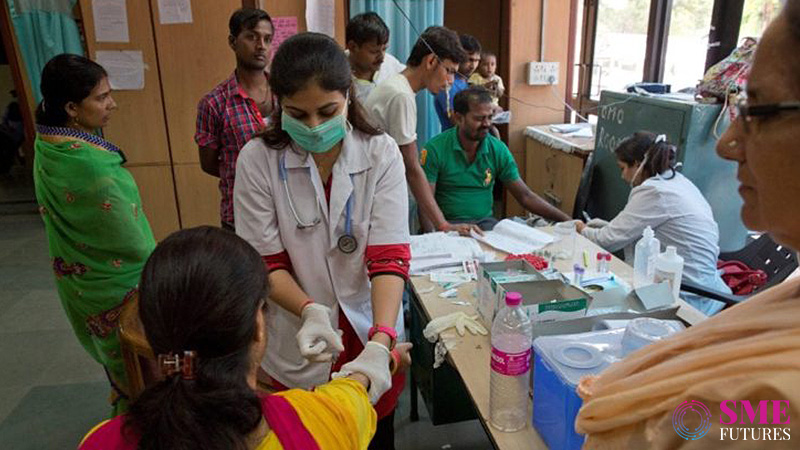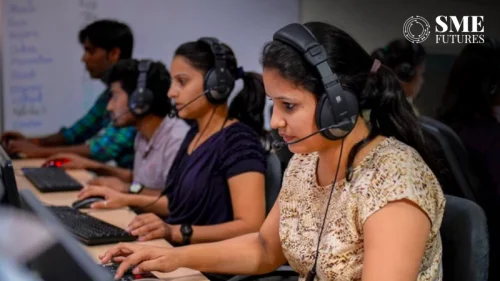The COVID-19 has disrupted numerous lives and economies in an unprecedented manner. The response to coronavirus pandemic has put emphasis on the importance of robust healthcare system. However, despite gaps and challenges healthcare sector has played a pivotal role in fight with the virus at various fronts.
Meanwhile, government has already envisaged increasing public expenditure on healthcare to 2.5 per cent of GDP (from around 1.3 per cent currently).
The Union Government had allocated a budget of Rs 69,000 crores in budget 2020, towards the healthcare sector for the FY 2020-2021.
Experts are now expecting measures related to the revival healthcare industry in this budget to make it more robust for addressing a medical upheaval like that of last year.
Impending measures to boost revival of healthcare
In its recommendation to finance ministry, Healthcare Federation of India, NATHEALTH has urged the government to prioritise recovery of the sector in the budget of 2021-22. “It is important to note that the private health sector has been standing alongside the government in managing the pandemic. The situation is expected to continue in the foreseeable future which makes these recommendations very important,” NATHEALTH said in a statement.
For the short term, federation has requested for zero-rating of GST for healthcare services. This will not only ensure that the credit chain is intact but will also ensure that the input taxes are not loaded into the cost of healthcare services. Besides zero-rating GST, NATHEALTH has also recommended various measures to finance ministry for faster recovery of the sector.
According to the body, ministry should consider extending exemptions available for the education sector to healthcare. “Companies engaged in healthcare services which have un-utilized MAT credit should be allowed to avail the reduced corporate tax regime of 25 per cent,” said NATHEALTH in a statement. In addition to this, the government may also consider five-year interest-free loan for the sector which can be facilitated through banks.
Due to the heavy revenue loss, financial burden and costs have escalated for private healthcare sector. Hence, the association also recommends considering lower TDS for FY21 and FY22. “There is an immediate need to provide solutions to the short-term problems caused due to COVID-19 and alongside address the long-standing gaps in our healthcare system,” NATHEALTH president Preetha Reddy said.
“The objective of these recommendations is to ensure recovery and sustenance of healthcare providers (small, medium, and large) and to drive policy consensus,” she ad of ded. The long-term recommendations advocate for adoption of a scientific costing and market based fair pricing rather than broad-price capping exercises under Ayushman Bharat-PMJAY. The government should also create a comprehensive medical value travel (MVT) programme by the name of ’Heal in India’ to leverage an immense opportunity to become a global healthcare destination.

Emphasis on expansion of digital healthcare
COVID-19 pandemic has changed the course of healthcare services with the inception of digital solutions. Services such as telemedicine and online consultations have proved to be life-saving amidst nationwide lockdown. It has also opened whole new gamut of market and opportunities for small and medium companies.
Last year also the witnessed rise of numerous new start-ups in this segment.
“Hence, the upcoming budget needs to look at challenges posed by this unprecedented pandemic and accordingly make allocations to meet new demands of the healthcare sector. The new normal and evolved ways of working makes the system more self-reliant,” said Dr KK Aggarwal, President Heart Care Foundation of India and CMAAO.
Healthcare in India is unquestionably moving towards digitization. Telemedicine is becoming the norm rapidly. According to Agarwal, the concept of home care has caught attention of the world. Home care of Covid-19 cases added to the capacity of healthcare system during the peak of pandemic. “Now more and more illnesses would be managed at home. The entire country therefore should be connected to facilitate tele-consultations.”
Advocating the need for expansion of digital health services in whole country, Satish Kannan, Co-Founder & CEO, MediBuddy-DocsApp believes that entry to healthcare for an individual will start with tele-consultation and then will move to meeting physical requirements. Hence, it is imperative to focus on expanding the digital health and government should consider on this aspect in the upcoming budget.
“The Budgetary allocations for health in 2018-19 and 2019-20 witnessed a marginal increase of approximately 5 per cent). The need to strengthen our healthcare infrastructure especially digital health has been ascertained with the covid-19 crisis. Budget-2021 should focus on the expansion of digital healthcare that has great potential to make healthcare more affordable and accessible,” tells Satish Kannan.
He further adds, “The Indian digital healthcare market is expected to grow by six times with a record CAGR of 25 per cent by Dec 2021. On the basis of this forecast, the adaption of digital will be faster than that of traditional. Given the impact of COVID-19 on the global and Indian digital health industry, we expect the Industry size to grow up to a worth of US$ 6 billion (Rs ~431.97 billion) by 2021.”
Bridging the rural-urban divide in healthcare
Meena Ganesh, MD and CEO, Portea Medical tells us that this is the time to detect the weak areas of our healthcare ecosystem and take steps to bridge the gaps in infrastructure, facilities, and financial provisions. The major challenge that needs to be addressed in this budget is the rural-urban divide in healthcare.
“Despite about 75 per cent of Indian population residing in rural areas, the healthcare concentration is heavily concentrated in urban areas. The absence of hospitals and qualified doctors in the rural areas has resulted in patients flocking to major cities from all over the country and incurring additional expenses as well as loss of wages for patients. This is where the delivery of health services in rural areas through e-health or e-medicines and others is going to play a transformational role,” she says.
Ganesh further suggests that the government must increase the medical and training infrastructure in a big way. She advices, “The best fastest way to ensure quality healthcare access in the rural India is through e-health or e-medicine services. Funds must be allocated towards skill development of teachers, nurses, paramedical staff, and caregivers. Next step in this direction is allocating budget for home-based healthcare ecosystem.”
She then recommends government to focus on public-private partnership, to accelerate the growth of infrastructure in an effective manner. “Through development of an alternate on home healthcare system, we can reduce the burden on institutional healthcare. Investing in at home healthcare is less cost-intensive than building and maintaining new hospitals and this way larger number of patients and healthcare seekers can be catered,” she further adds.
Prior to the outbreak of virus, the healthcare sector was slow in technology adoption. However, the lockdown helped telemedicine demonstrate its potential in impacting growth and expansion of this sector. Anmol Arora, CEO, Docvita, a healthcare platform also views telemedicine as India’s effective solution to bridge the rural-urban divide in the demand and supply of healthcare services.
According to him, there is no better time for the government to give the industry impetus to bridge the gap between healthcare accessibility and affordability. “The post-pandemic budget is expected to keep health as a top-notch priority. Increased allocations in the union budget 2021 for telemedicine and NDHM can benefit our healthcare infrastructure and can build a strong backbone for our country’s digital health infrastructure,” he advises.
Necessitate the formation of health investigating agencies
The pandemic was a historic event that compelled industries to adapt themselves according to adversities. Commenting on this, Aggarwal asserts that there is need to establish health investigating agencies similar to country’s intelligence agencies such as National Investigation Agency (NIA), RAW etc and hope government would consider this as focus for healthcare.
“These agencies will alert about such outbreaks occurring in any part of the world and be prepared in advance to prevent its entry and trace the pathogen, once it has entered the country. The new budget should take this into consideration. Similarly, all necessary amendments in law and policies should be made only by the central government in collaboration with states,” he says.
Adding to that, he also pointed out that the healthcare sector should now be given equal importance to healthcare sector in the budget planning. Government should allocate funds for development of new vaccines. He professes, “India has done a lot in vaccine research and should take the lead in global development of vaccines and improve foreign exchange in lieu of this. Diagnostics and drugs have received fast clearance to manage COVID-19 within a year. This should become a norm for development of other drugs and vaccines.”
Availability of easy funding for healthcare startups
The government’s priority in this budget should be to boost the economy that got severely hit due to the unprecedented health crisis. While economic stress impacted various businesses adversely, healthcare companies were not an exception. On the contrary, 2020 was the year for healthcare companies especially startups. Hence, experts feel that there should be special emphasis on startup funding in the upcoming budget.
Dr Harshit Jain, Founder and CEO, Doceree says that start-ups being an important component of the economy should play a crucial role in driving it forward.
He claims, “We are present in two markets namely the US and India. I think the US government is more supportive for start-ups in terms of financing and I would seek the same kind of support in India with respect to access to capital and access to cheaper credit.”
He further adds, “The cost to capital in India is apparently highest as compared to other markets and a lot of paperwork and approvals are required. This makes the entire process very cumbersome. The government should make the process of raising funds and related procedures easier so that start-ups especially those in their early stages could be at ease.”
Allocation of budget for mental health
Experts opine that the budget should not neglect mental health services and there are ample reasons behind that. Firstly, the pandemic has highlighted the need of enhanced mental health services. However, the central government spends less than 0.06 per cent of the total health budget in the National Mental Health Program.
The budget allocated was brought down to Rs 40 crore from Rs 50 crore in FY18. Whereas, only Rs 5 crore were spent each year. Secondly, there are fewer mental health professionals. Currently there is only one mental health professional per 13000 people and most mental health experts face unreasonably high work pressure without any form of institutional support.
Thirdly, India has highest suicide rate in the world, the largest number of mental health patients in the world, and a treatment gap of over 70 per cent. Medical experts warn that amidst the pandemic, a nationwide mental health crisis was widespread. Therefore, there is a dire need to increase investment in mental health programmes both professionally and personally.
Sumit Mittal, Founder of VentAllOut says, “Virtual counselling can help in increasing access to mental health facilities in areas that lack trained professionals. Besides, the government should launch awareness programmes to promote complementary systems of medicine, naturopathy and yoga through structured exercises and dietary modifications to help in overcoming stress-related problems in a holistic approach.”
The need of the hour is to acknowledge that mental illness contributes to a significant socio-economic impact on the overall health of the country. Until there is sufficient investment to promote awareness, education, and infrastructure, mental health issues will cause more damage to the economy. Therefore, budget 2021 should look to address the need of an effective mental health infrastructure and to increase investments in mental health programmes.
Apart from these measures, industry body FICCI has also recommended a set of recommendations for the healthcare budget. This includes extending tax benefits under Sec 35AD (100 per cent deduction on capital expenditure) to all hospitals which is applicable only to hospitals having minimum capacity of 100 beds.
It talks about weighted deduction (150 per cent of capital expenditure) allowed for healthcare providers for CAPEX incurred for fighting COVID pandemic. Secondly, it recommends incentivizing skill development in healthcare sector to bridge the huge skill gap. It also provides weighted deduction of 150 per cent of expenses incurred on skill development in healthcare.
Adding to it, government should also incentivize health insurance for individuals and encourage voluntary purchase, the quantum of deduction towards payment of medical insurance premium should be enhanced (to Rs 50,000 from current Rs 25,000).
Government should also consider launch of Healthcare Infrastructure Fund and Medical Innovation Fund. This would facilitate greater access to capital for the industry. Last but not the least Medical Value Tourism (including AYUSH related tourism) can also become a significant contributor to foreign exchange and should be promoted. Hence, by endorsing these steps government can strengthen the healthcare sector to counter any medical catastrophe in future.











